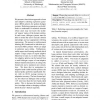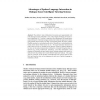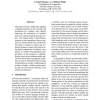36 search results - page 3 / 8 » Learning with noisy supervision for Spoken Language Understa... |
ACL
2010
13 years 3 months ago
2010
We present a data-driven approach to learn user-adaptive referring expression generation (REG) policies for spoken dialogue systems. Referring expressions can be difficult to unde...
ACL
2011
12 years 8 months ago
2011
Information extraction (IE) holds the promise of generating a large-scale knowledge base from the Web’s natural language text. Knowledge-based weak supervision, using structured...
ITS
2004
Springer
13 years 10 months ago
2004
Springer
Abstract. The ability to lead collaborative discussions and appropriately scaffold learning has been identified as one of the central advantages of human tutorial interaction [6]. ...
AAAI
2012
11 years 7 months ago
2012
Twitter sentiment analysis (TSA) has become a hot research topic in recent years. The goal of this task is to discover the attitude or opinion of the tweets, which is typically fo...
ACL
2006
13 years 6 months ago
2006
This paper presents a method for adapting a language generator to the strengths and weaknesses of a synthetic voice, thereby improving the naturalness of synthetic speech in a spo...



